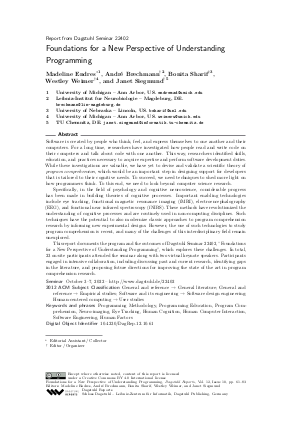Foundations for a New Perspective of Understanding Programming (Dagstuhl Seminar 22402)
Authors Madeline Endres, André Brechmann, Bonita Sharif, Westley Weimer, Janet Siegmund and all authors of the abstracts in this report
-
Part of:
Issue:
Dagstuhl Reports, Volume 12, Issue 10
Part of: Volume: Dagstuhl Reports, Volume 12
Part of: Journal: Dagstuhl Reports (DagRep) - License:
 Creative Commons Attribution 4.0 International license
Creative Commons Attribution 4.0 International license
- Publication Date: 2023-05-03
File

PDF
DagRep.12.10.61.pdf
- Filesize: 2.3 MB
- 23 pages
Document Identifiers
Subject Classification
ACM Subject Classification
- General and reference → Empirical studies
- Software and its engineering → Software design engineering
- Human-centered computing → User studies
Keywords
- Programming Methodology
- Programming Education
- Program Comprehension
- Neuro-imaging
- Eye Tracking
- Human Cognition
- Human Computer Interaction
- Software Engineering
- Human Factors
Metrics
- Access Statistics
-
Total Accesses (updated on a weekly basis)
0Document
0Metadata
Abstract
Software is created by people who think, feel, and express themselves to one another and their computers. For a long time, researchers have investigated how people read and write code on their computers and talk about code with one another. This way, researchers identified skills, education, and practices necessary to acquire expertise and perform software development duties. While these investigations are valuable, we have yet to devise and validate a scientific theory of program comprehension, which would be an important step in designing support for developers that is tailored to their cognitive needs. To succeed, we need techniques to shed more light on how programmers think. To this end, we need to look beyond computer science research. Specifically, in the field of psychology and cognitive neuroscience, considerable progress has been made in building theories of cognitive processes. Important enabling technologies include eye tracking, functional magnetic resonance imaging (fMRI), electroencephalography (EEG), and functional near infrared spectroscopy (fNIRS). These methods have revolutionized the understanding of cognitive processes and are routinely used in non-computing disciplines. Such techniques have the potential to also modernize classic approaches to program comprehension research by informing new experimental designs. However, the use of such technologies to study program comprehension is recent, and many of the challenges of this interdisciplinary field remain unexplored. This report documents the program and the outcomes of Dagstuhl Seminar 22402, "Foundations for a New Perspective of Understanding Programming", which explores these challenges. In total, 23 on-site participants attended the seminar along with two virtual keynote speakers. Participants engaged in intensive collaboration, including discussing past and current research, identifying gaps in the literature, and proposing future directions for improving the state of the art in program comprehension research.
Cite As Get BibTex
Madeline Endres, André Brechmann, Bonita Sharif, Westley Weimer, and Janet Siegmund. Foundations for a New Perspective of Understanding Programming (Dagstuhl Seminar 22402). In Dagstuhl Reports, Volume 12, Issue 10, pp. 61-83, Schloss Dagstuhl – Leibniz-Zentrum für Informatik (2023)
https://doi.org/10.4230/DagRep.12.10.61
BibTex
@Article{endres_et_al:DagRep.12.10.61,
author = {Endres, Madeline and Brechmann, Andr\'{e} and Sharif, Bonita and Weimer, Westley and Siegmund, Janet},
title = {{Foundations for a New Perspective of Understanding Programming (Dagstuhl Seminar 22402)}},
pages = {61--83},
journal = {Dagstuhl Reports},
ISSN = {2192-5283},
year = {2023},
volume = {12},
number = {10},
editor = {Endres, Madeline and Brechmann, Andr\'{e} and Sharif, Bonita and Weimer, Westley and Siegmund, Janet},
publisher = {Schloss Dagstuhl -- Leibniz-Zentrum f{\"u}r Informatik},
address = {Dagstuhl, Germany},
URL = {https://drops.dagstuhl.de/entities/document/10.4230/DagRep.12.10.61},
URN = {urn:nbn:de:0030-drops-178209},
doi = {10.4230/DagRep.12.10.61},
annote = {Keywords: Programming Methodology, Programming Education, Program Comprehension, Neuro-imaging, Eye Tracking, Human Cognition, Human Computer Interaction, Software Engineering, Human Factors}
}
